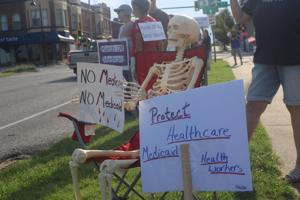Wednesday marked a significant historical milestone as President Lyndon B. Johnson’s signing of the legislation that established Medicaid and Medicare reached its 60th anniversary. However, in Carbondale, this commemoration was underscored by fervent protests against ongoing threats to these vital social safety net programs. Despite the sweltering heat, dozens gathered, articulating their profound concerns over proposed cuts that could significantly impact healthcare policy and access for millions.
The original vision behind Medicaid and Medicare was to provide a robust healthcare safety net, ensuring access to medical services for America’s most vulnerable populations, including low-income families, seniors, and individuals with disabilities. For six decades, these foundational programs have played an indispensable role in shaping the nation’s public health landscape, becoming pillars of support for countless citizens.
The scene in Carbondale was a testament to the enduring importance of these programs. Protesters sought respite under the shade of a pavilion, but their voices remained resolute as speakers passionately discussed the critical need for continued investment in Medicaid. They highlighted its pivotal role in protecting public health and ensuring equitable access to medical care, especially in the face of rising costs and economic disparities.
A central concern voiced by the activists was the immediate threat posed by recent legislative actions. Cuts to Medicaid passed earlier this month are perceived as a direct assault on the program’s ability to provide comprehensive coverage. Demonstrators emphasized how these reductions could drastically limit services, jeopardize beneficiaries’ well-being, and unravel years of progress in public healthcare provision.
Speakers at the gathering meticulously outlined the vast reach of both Medicaid and Medicare, underscoring their collective achievement in extending health coverage to millions of Americans who might otherwise go without. They presented compelling arguments for why these programs are not merely expenditures but essential investments in the nation’s human capital and overall societal stability.
The collective sentiment among the protesters resonated with a deep appreciation for the historical impact of the programs while simultaneously expressing alarm over their precarious future. The 60th anniversary served as a poignant reminder of both the achievements and the persistent battles required to safeguard affordable healthcare for all citizens.
This localized demonstration in Carbondale mirrors a broader national dialogue concerning the future of America’s social welfare initiatives. As debates surrounding government spending and social responsibilities intensify, the commitment to maintaining robust social safety net programs like Medicaid and Medicare remains a hotly contested subject on the national healthcare policy agenda.
The anniversary celebration intertwined with the spirited dissent, creating a powerful tableau of remembrance and renewed determination. It underscored the ongoing commitment of advocates to ensure that the promise of affordable healthcare, envisioned six decades ago, continues to serve future generations despite the continuous political challenges to its funding and structure.






Leave a Reply